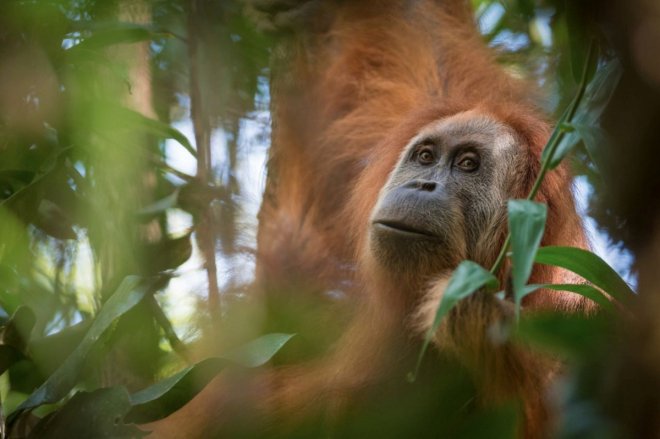
Researchers have identified a new species of orangutan, the reddish-haired great ape, on the Indonesian Island of Sumatra. The orangutans which had inhabited the Batang Toru forest were given the status of a new species.
According to the research paper published in the journal Current Biology, the newly classified species of orangutans had genetic, skeletal and tooth difference from the other two known species of the apes.
The new classification has increased the total number of ape species to seven. Africa's eastern and western gorilla, chimpanzees and bonobos are the other known species of great apes other than the orangutans. The scientists have named the new species as Tapanuli orangutan, with scientific name Pongo tapanuliensis.
Otherwise, the word 'orangutan' means "person of the forest" in the Indonesian and Malay languages. They were considered as a single species till 1996 and were later separated as Sumatra and Borneo based species.
The International Union for Conservation of Nature (IUCN) has already placed the Borneo species under the Critically Endangered List which means "only one step from going extinct". The newly identified Tapanuli orangutan lives in the south of the Sumatran orangutan dwelling range.
The scientists started to note the difference of the new species from the Sumatran orangutans about two decades ago, after finding a difference in the tooth and skull shape of the Tapanuli. The researchers found the difference in the new orangutans which had died of wounds afflicted by villagers.
Matthew Nowak of Sumatran Orangutan Conservation Programme said that there are no more than 800 individuals remaining across three fragmented forest areas. "In addition to threats like hunting by humans, significant areas of the Tapanuli orangutan's range are seriously threatened by habitat conversion for small-scale agriculture, mining exploration and exploitation, a large-scale hydroelectric scheme, geothermal development and agricultural plantations," he told Reuters.
Orangutans are recognized as the world's biggest arboreal mammals, who lead more solitary lives compared with other great apes. They live mostly on top of the trees and eat fruits, spending their time in the canopy of trees. Orangutans' arms are longer than their legs which makes them a predominant tree dweller.









